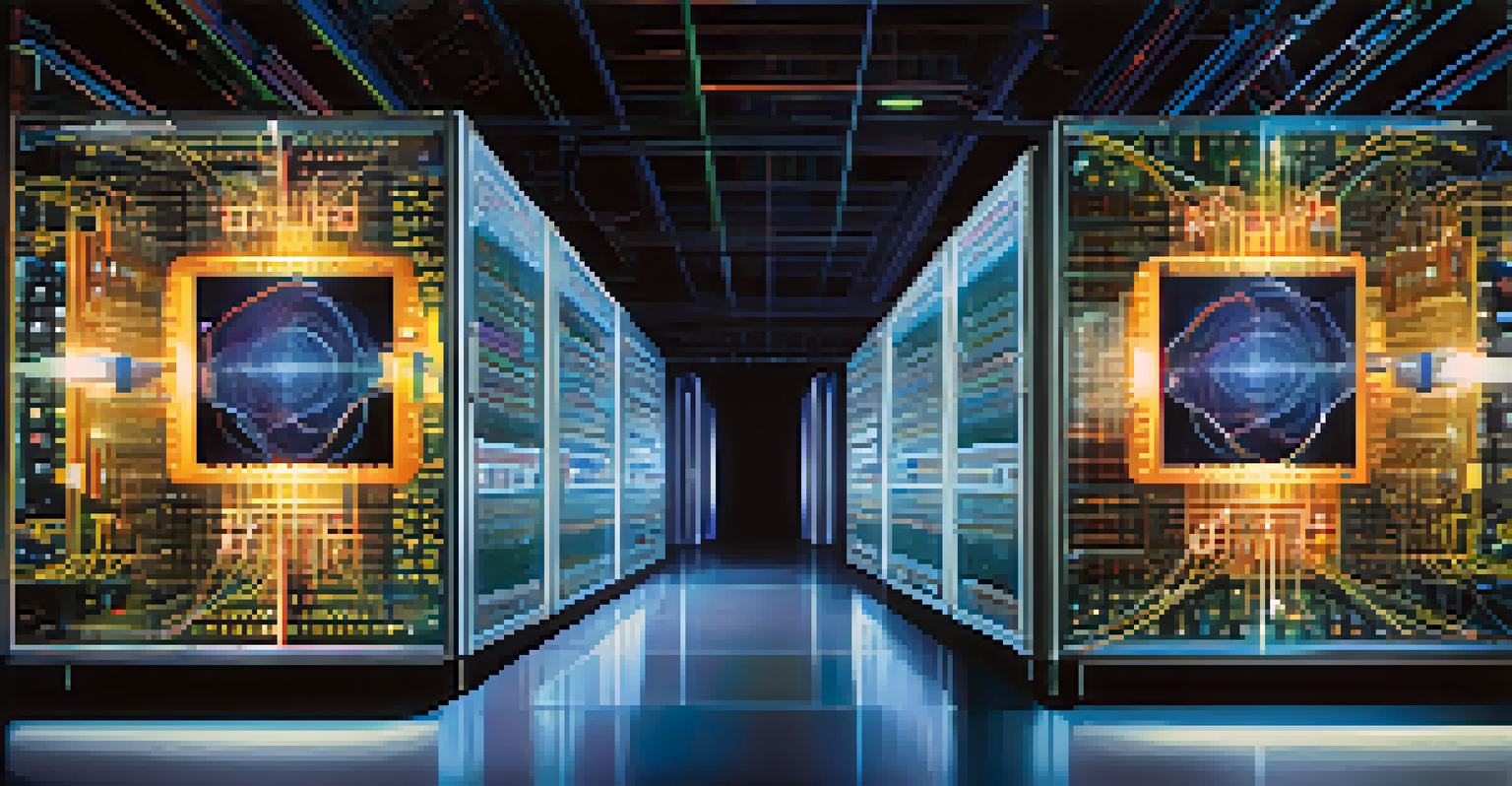Comparative Analysis: Quantum Computers vs Supercomputers

Understanding Quantum Computers: The New Frontier
Quantum computers harness the principles of quantum mechanics, allowing them to process information in fundamentally different ways than classical computers. Instead of bits, which are either 0 or 1, quantum computers use qubits that can exist in multiple states simultaneously. This unique capability enables quantum computers to solve specific complex problems much faster than traditional systems, making them a groundbreaking technology.
Quantum computing is the future, and it holds the potential to change the world as we know it.
For instance, imagine trying to find your way through a labyrinth. A classical computer would explore one path at a time, while a quantum computer could evaluate multiple pathways all at once, significantly speeding up the search process. This makes quantum computing particularly promising for areas like cryptography, drug discovery, and optimization problems.
As research continues, the full potential of quantum computers is still being explored. However, they are expected to complement rather than replace traditional computing systems, offering solutions for problems that are currently out of reach for even the most powerful supercomputers.
Supercomputers: The Giants of Traditional Computing
Supercomputers are powerful machines built to handle vast amounts of data and perform complex calculations at incredible speeds. They utilize thousands of processors working in parallel, enabling them to tackle large-scale simulations and data analysis tasks. Commonly used in scientific research, climate modeling, and financial forecasting, supercomputers are crucial for problems requiring immense computational power.

Consider a supercomputer like a massive library, where each book represents a task being processed. By employing multiple librarians (processors) to work simultaneously, the library can handle an overwhelming number of requests efficiently. This parallel processing capability is what sets supercomputers apart and allows them to perform calculations that would take conventional computers years to complete.
Quantum vs. Supercomputers
Quantum computers and supercomputers differ fundamentally in how they process information, leading to distinct advantages in various applications.
Despite their impressive capabilities, supercomputers face limitations in specific applications, particularly those involving quantum mechanics. They excel at simulations and data-driven tasks, but there are certain problems where quantum computing could outperform them, particularly in areas like optimization and cryptography.
Key Differences: Quantum vs Supercomputing
The primary distinction between quantum computers and supercomputers lies in how they process information. Quantum computers utilize qubits and the principles of superposition and entanglement, while supercomputers rely on classical bits and parallel processing. This fundamental difference leads to varying strengths and weaknesses in each technology's applications.
The supercomputer is not just a tool; it is a partner in the quest for knowledge.
For example, quantum computers can solve specific problems, such as factoring large numbers or simulating quantum systems, much more efficiently than supercomputers. Conversely, for tasks that require extensive data manipulation, like weather modeling or genetic sequencing, supercomputers shine due to their ability to process vast datasets quickly.
Ultimately, the effectiveness of each system depends on the type of problem being addressed. While supercomputers are currently more versatile for a wide range of tasks, quantum computers are expected to revolutionize particular fields in the coming years, highlighting the unique advantages each brings to the table.
Applications of Quantum Computers: Where They Shine
Quantum computers hold immense potential in fields like cryptography, materials science, and pharmaceuticals. For instance, they can crack complex encryption algorithms, which could revolutionize cybersecurity, or simulate molecular interactions to expedite drug discovery processes. By leveraging their unique capabilities, quantum computers can tackle problems that are currently unsolvable with classical methods.
In the realm of materials science, quantum computers can help researchers design new materials with desired properties by simulating atomic interactions at an unprecedented scale. This could pave the way for breakthroughs in energy storage, superconductors, and much more, pushing the boundaries of innovation.
Applications of Quantum Computing
Quantum computers show immense potential in fields like cryptography and materials science, offering solutions to problems currently unsolvable by classical methods.
Moreover, as industries recognize the potential of quantum computing, investments in research and development are increasing, promising to unlock even more applications in the future. This growing interest indicates that quantum computing is not just a theoretical concept, but a practical tool that could reshape various sectors.
Supercomputing Applications: The Established Workhorse
Supercomputers have a proven track record in various disciplines, including meteorology, physics, and bioinformatics. They are instrumental in modeling weather patterns, simulating nuclear reactions, and analyzing large sets of genomic data, providing insights that drive scientific discoveries and innovations. Their ability to handle large-scale problems makes them indispensable in today's research landscape.
For instance, in climate science, supercomputers are used to create highly detailed models that predict future climate scenarios based on various variables. These simulations help scientists understand climate change's potential impacts, guiding policy decisions and environmental strategies.
Furthermore, supercomputers contribute to advancements in artificial intelligence by processing vast amounts of data needed to train machine learning algorithms. This versatility ensures that supercomputers remain a critical resource for researchers and industries alike as they tackle complex challenges across multiple domains.
Challenges Facing Quantum Computing Development
Despite the excitement surrounding quantum computing, significant challenges remain before it can reach its full potential. Issues such as error rates, qubit coherence times, and scalability hinder the development of practical quantum systems. Researchers are actively working on overcoming these obstacles to make quantum computing more accessible and reliable.
For example, qubit error rates can lead to inaccurate calculations, which is a major hurdle for quantum computers. Scientists are investigating error correction techniques and developing more stable qubit designs to improve reliability. Moreover, achieving the necessary conditions for qubit operation, such as extremely low temperatures, adds complexity to building functional quantum computers.
Future Collaboration in Computing
The future of computing may involve a collaboration between quantum computers and supercomputers, leveraging their unique strengths for enhanced problem-solving.
As the field evolves, collaboration among researchers, technologists, and industries is crucial to address these challenges. Only by working together can we unlock the full potential of quantum computing and pave the way for its integration into various sectors.
The Future of Computing: Quantum and Supercomputing Together
Looking ahead, the future of computing may not be a competition between quantum computers and supercomputers but rather a collaboration. Each technology offers unique strengths that can complement one another. Quantum computers can tackle specific problems, while supercomputers excel at handling large-scale data processing.
Imagine a scenario where researchers utilize supercomputers to analyze vast datasets and then employ quantum computers to solve complex optimization problems arising from that data. This synergy could lead to breakthroughs in fields like drug development, climate modeling, and even artificial intelligence, as each technology enhances the other's capabilities.

As we continue to explore the potential of both quantum and supercomputing, the key will be to understand how to leverage each system's strengths effectively. By doing so, we can unlock new possibilities and drive innovation in ways we have yet to imagine.